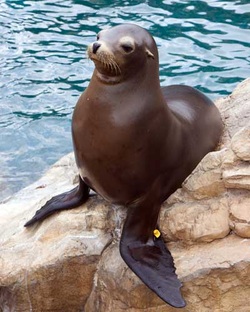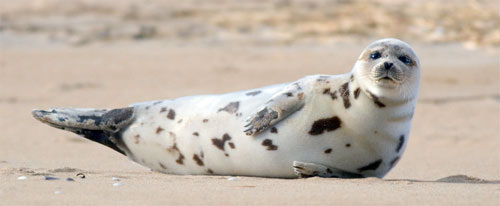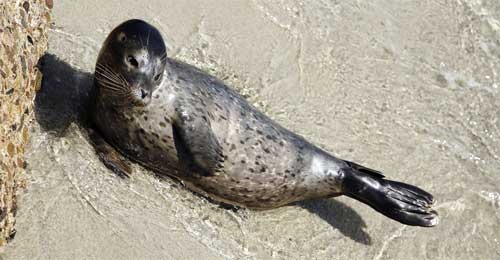 Harbour Seals (Phoca vitulina) are true seals of the Northern Hemisphere. Having the widest range of all pinnipeds, Common Seals are found in coastal waters of the northern Atlantic and Pacific Oceans as well as those of the Baltic and North Seas. With an estimated 400,000-500,00 individuals, the total population of Common Seals is not threatened as a whole. Local populations have been reduced or eliminated through outbreaks disease and conflict with humans, both unintentionally and intentionally. While it is legal to kill seals which are perceived to threaten fisheries in the United Kingdom, Norway and Canada, commercial hunting is illegal; the seals are also taken in subsistence hunting and accidentally as bycatch in fishing nets. Physical description With each individual possessing a unique pattern of fine, dark spots, Common Seals vary in colour from brownish black to tan or grey; underparts are generally lighter. The body and flippers are short, with a proportionately large, rounded head. The nostrils appear distinctively V-shaped; as with other true seals, the ears are not visible.Including the head and flippers, Common Seals may reach an adult length of c. 185 centimetres and a weight of 130 kilograms. Females are smaller than males. Habitat and diet Characterized as being habitual in their choice of resting sites, Common Seals may spend several days at sea and travel up to 50 kilometres in search of feeding grounds. Resting sites may be both rugged, rocky coast such as that of the Hebrides, or sandy intertidal zones; some seals may also enter esturies. The seals frequently choose to congregate in harbours, lending the animals their other common name. The feeing habits of Common Seals has not been studied closely; they are known to prey primarily upon fish such as herring, whiting and flatfish, and occasionally upon shrimp and squd. Common Seals are thought able to remain submerged for up to 10 minutes, reaching depths of 50 metres or more. Play Games
0 Comments
Leave a Reply. |
Important WebsitesFirst Grade Code.org Categories
All
Archives
May 2019
|



 RSS Feed
RSS Feed
